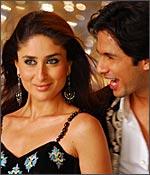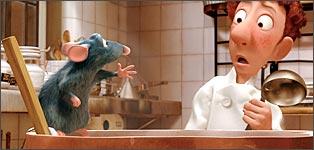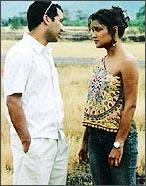I spent a good deal of time these last few days watching movies -- some new, others old favourites I wanted to revisit for various reasons (count Last Tango in Paris, Farewell My Concubine, The Godfather, Day for Night and Cinema Paradiso as the stand-outs in the latter list).
The new ones included Breach (which sparked some thoughts on adapting real life incidents into movies, which I'll leave for another day); Saawariya (which I watched with initial indifference turning to irritation that in turn morphed into a kind of horrified disbelief); Om Shanti Om (I have spent some wine-soaked evenings watching one or the other of the awards functions Bollywood stages to indulge its own collective ego; this film was no different, and just as palatable when you are in fast-food mood); No Smoking (fascinating, laudable in its attempt to go into waters too deep for the average filmmaker, and on rare occasions irritating, when director Anurag Kashyap doodled with his craft rather than focus on the narrative); and Jab We Met (an oft-told tale, leavened by the lack of pretentiousness in the narration, and the earnestness the two principal leads brought to their parts).
 I also spent more time than I care to think about trawling the net for reviews of OSO (almost all of which were characterised by an amused tolerance) and Saawariya (universally savage; to then have Sanjay Leela Bhansali reference Bimal Roy, Satyajit Ray and suchlike to buttress his claim to the status of misunderstood genius was a bit much).
I also spent more time than I care to think about trawling the net for reviews of OSO (almost all of which were characterised by an amused tolerance) and Saawariya (universally savage; to then have Sanjay Leela Bhansali reference Bimal Roy, Satyajit Ray and suchlike to buttress his claim to the status of misunderstood genius was a bit much).
And then -- classic serendipity -- last night I watched Ratatouille for a second time, and the words of food critic Anton Ego (in the cultivated, cultured accents of Peter O'Toole) jumped out at me. Remember?
"In many ways, the work of a critic is easy. We risk very little; yet enjoy a position over those who offer up their work and their selves to our judgment. We thrive on negative criticism, which is fun to write and to read.
"But the bitter truth we critics must face is that in the grand scheme of things, the average piece of junk is probably more meaningful than our criticism designating it so."
 That segment in the film raised a whole heap of questions about critics and criticism -- questions I hope you can, and will, answer: What value do you place on film criticism? Do reviews help you decide which movies to watch, and which to avoid? Has a critic ever influenced you in favour of, or against, a film, and/or its maker? Has a critic ever enhanced your understanding/appreciation of a particular film?
That segment in the film raised a whole heap of questions about critics and criticism -- questions I hope you can, and will, answer: What value do you place on film criticism? Do reviews help you decide which movies to watch, and which to avoid? Has a critic ever influenced you in favour of, or against, a film, and/or its maker? Has a critic ever enhanced your understanding/appreciation of a particular film?
No, don't leave your answers on the message board -- I skimmed through the one attached to the first column I wrote, and decided that in the interests of preserving the remnants of my own sanity, I'll give message boards a wide berth here on in. Mail me instead.
Hopefully, when I get your mails, will try to condense them into talking points, then bounce them off some of our leading critics and see what they have to say in response.
Speaking of mails, among the many fascinating letters of recent vintage is one from Sarthak DasGupta, a young filmmaker who has just completed his debut film with television stars Aamir Bashir and Sandya Mridul in the lead, and acting coach Barry John and Bollywood starlet Koel Purie playing key supporting characters.
Sarthak (aged 36), who has been updating me on his doings through a series of email exchanges, could be the prototype for the sort of young talent spawned by the multiplex culture, and seeking niches of their own on the fringes of mainstream cinema.
The business management graduate quit a big ticket job in Mumbai's corporate world, and shifted to making short films. "Easy Chair was a film about an up-rooted old man's relationship with his ancestral easy chair," Sarthak says. "Gurudakshina was a film which dealt with the politics of Hindustani Classical Music. The Violin Sonata dealt with a depressed violinist's altered sense of reality."
 The Great Indian Butterfly, his debut feature film (shot, he says, in just 20 days in locales in Mumbai, Goa and in-between), is thematically as 'indie' as it gets. From the writer-director, this synopsis:
The Great Indian Butterfly, his debut feature film (shot, he says, in just 20 days in locales in Mumbai, Goa and in-between), is thematically as 'indie' as it gets. From the writer-director, this synopsis:
"Krish and Meera are a young Indian couple climbing the ladder of the corporate rat race in a nation hurtling forward at a rate unprecedented in its long history. Stressed, frustrated and unable to come to terms with the sacrifice required for success, they go in search of a legendary magical insect -- The Great Indian Butterfly.
"Last seen by the unknown explorer Carodiguez in a remote valley located in erstwhile colonial Goa, the butterfly possesses a magical aura, granting immense happiness to the person who catches it. In their journey, the couple travel outwardly and inwardly over some of the most amazing landscapes of nature and mind.
"Will they find the Butterfly? Can they survive the journey? Can it cost them their relationship? Will the Great Indian Butterfly wreck havoc on their souls? Will there be redemption? Or is it a futile hunt for an answer to their crumbling lives? A simple tale in the complex miasma of a changing India."
What was the creative spark for the film, the thinking that underpins the storyline? Again, Sarthak explains at length:
"When I started to write the '...Butterfly...', there was no butterfly in it. I was going to call it The Burnout. The idea dealt with the urban ambition epidemic and its sad outcomes. I realised I was only willing to observe and document just one side of the issue. A friend pointed out to me this legend of the butterfly and I immediately found the ground on the other side of the issue that I needed to explore. This search for the butterfly brought in the attempt to go beyond the problem into the realms of its possible solutions.
"The trauma of chasing the lucre and retaining your sanity is quite a difficult thing to handle. But treading the same path with love in the heart and a dispassionate indifference to the sense of success probably makes the journey enjoyable as well.
"All around us we hear stories of India being a big emerging market and even growing up to be a powerful nation. We have made a difference in the world through the power of our ideas. The film tries to capture that unique Indian spirit. It's not esoteric and complex. It's a simple story of discovery in present day India.
"There was a reason to base the film in Goa. The Goa state of mind is simply unbelievable. Thousands of people land up in this state searching for a place to get away. I've known of several who have come back with a sense of peace and a promise. Goa is not merely a tourist destination; it's a pilgrimage to the modern Indian. The attraction is not merely the typical beach and shack joints. It's the unique combination of a people who live life in their own terms. Live like they want rather than live like they should. Our attempt was to show Goa not as a fun place, but as a place where catalyses happen.
"Besides, Goa is also the place where according to the 'legend' we have the Carodiguez valley where you find the butterfly."
Getting to 'meet' Sarthak through e-mails has been a joy, if only because it confirms that there are young, aspiring filmmakers who manage to avoid being drowned in the deluge of 'paint-by-numbers' offerings from the big Bollywood studios and directors; filmmakers who can think for themselves and, sans the support of studios and massive budgets, make their own kind of movies.
In other words, there's hope.
Whether Sarthak and his ilk find an audience is a secondary consideration; the priority is for young filmmakers to find their own voice. As with writing -- or indeed any form of art -- once you begin speaking in your own unique voice, an audience tuned to listen to such rare frequencies will evolve around you. And while on that, I'd love to hear from anyone out there doing such original work.
PostScript: Reams have been written about Saawariya; more reams have been expended by its director in his own defense. Out of that flash-flood of criticism and response, the one that caught my eye is a first person piece by Karan Johar in Tehelka in defense of the film and its maker. An excerpt:
"But despite the criticism he faces, I believe Sanjay's work will breathe for a long time. Art can never have unanimous takers, and hindsight is often more generous in its recognition. Many of the films we call cinematic gems today -- Awara, Pyaasa, Chaudhvi Ka Chand, Do Bigha Zameen -- were released to mixed reception in their time. Karz was not a universal hit; Kaagaz ki Phool was a resounding disaster and almost killed a part of Guru Dutt. In the same way, the real assessment of Sanjay's work will be in the future."
Agree or disagree, as you will (speaking for myself, I don't) -- it is still a well-articulated piece, eminently worth your time. And on that note, adios till next week.





